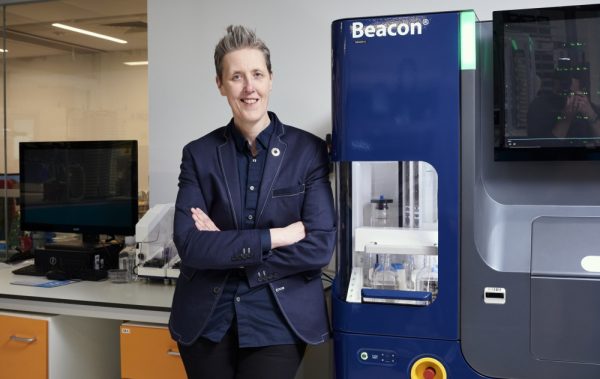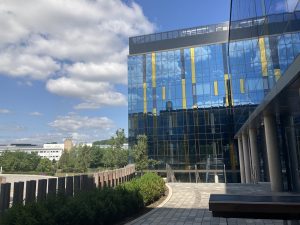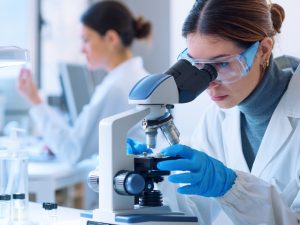
The University is to establish a new research and innovation hub focused on developing gene therapies to help treat or cure disease.
The £14.25m Engineered Genetic Control Systems for Advanced Therapeutics Hub will develop improved gene therapy techniques for patients with serious conditions.
It will create new biological tools to improve the effectiveness and safety of gene therapies, testing them in cancers, cardiovascular disease and rare diseases.
The hub, led by Professor Susan Rosser, will bring together a multidisciplinary team from the Universities of Edinburgh and Oxford, Imperial College London and the CRUK Scotland Institute.

Professor Rosser said:
Gene therapies have the potential to revolutionise healthcare by treating or even curing disease. But for them to be effective and safe they need to be delivered to the right place in the body, in the right amount, and for the right length of time. This is where engineering biology comes in.
" By developing a suite of tools and training scientists for academia and industry, we hope to realise the UK’s potential to be a global leader in engineering biology for healthcare and, ultimately, to improve global health. ”
Professor Rosser worked with Edinburgh Innovations (EI), the University’s commercialisation service, to secure the support and engagement from industry necessary for the Hub.
Dr Andrea Taylor, Director of EI’s Strategic Partnership Team, said:
Artificial intelligence and digital technologies are creating previously unimaginable opportunities to transform healthcare and how we treat disease. To realise these opportunities, we need to bring together different disciplines with the public, private and third sectors, as well as ensure access to cutting edge facilities such as the Edinburgh Genome Foundry – the world’s largest automated DNA factory.
Our Strategic Partnerships Team is focussed on building new collaborations that are ambitious in both scope and scale. We are proud to have harnessed significant industry engagement in this Engineering Biology Mission Hub and we are very excited about what we can now achieve, together, to meet our most pressing global data, climate and health challenges. "
Targeted treatment
Gene therapies work by replacing a disease-causing gene with a healthy one, inactivating disease-causing genes or introducing new or modified genes to help treat a disease.
For gene therapies to be effective and safe they need to precisely target the correct tissue, at the right level and for the right amount of time.
The team will develop and test a range of delivery systems, which involve the use of harmless viruses, stripped of their disease-causing abilities, to insert therapeutic genes into the correct tissue.
They will also build and test other genetic components that allow precise control over a therapeutic gene’s level of activity and duration of action inside human cells.
Research hubs
The new centre is one of six announced as part of a £100m UK-wide investment in engineering biology by UK Research and Innovation (UKRI).
Funding for the new hubs was provided by the UKRI Technology Missions Fund, with support from the Biotechnology and Biological Sciences Research Council (BBSRC).
Edinburgh researchers will also be involved in two of the other new hubs.
The Preventing Plastic Pollution with Engineering Biology (P3EB) Mission Hub will develop new biological technologies to convert plastic waste into high-value chemicals and products. The hub, led by the University of Portsmouth, will involve Professor Stephen Wallace and Dr Joanna Sadler from the School of Biological Sciences.
The Environmental Biotechnology Innovation Centre (EBIC), led by Cranfield University, will enhance and develop the natural abilities of micro-organisms to reduce the impacts of pollution. Professor Louise Horsfall, from the School of Biological Sciences, is also part of the research team.
As well as the six hubs, a series of projects have received Mission Awards that will fund projects for two years and include a share of £30 million funding.
Among those to receive a Mission Award is a project led by the University of Manchester, which also involves Professor Dominic Campopiano and Dr Amanda Jarvis from Edinburgh's School of Chemistry.
The project - which has been awarded around £1.9m - aims to develop a versatile and scalable platform for the manufacture of precisely engineered proteins using so-called genetic code expansion technology.
Professor Sir Peter Mathieson, Principal and Vice-Chancellor of the University of Edinburgh, said:
I am delighted that our researchers will play such pivotal roles in driving the next wave of innovation in engineering biology. These exciting technologies could help deliver a wide range of benefits to society, by providing new tools to tackle challenges in areas including health, environment and sustainability.
The research carried within these new hubs will contribute directly to the core missions of our recently launched Research and Innovation Strategy 2030, which aims to galvanise activity across the whole University to tackle urgent global challenges.”
Related links
Read more and get in touch with EI's Strategic Partnerships Team

Business Development Manager
Schools of Biology and Chemistry
College of Science & Engineering


